- Home
- Michael McDowell
Toplin Page 2
Toplin Read online
Page 2
Yet I never got so high as her eyes.
I was arrested by her open mouth, that amazing hole that ought to have had a bandage over it. I longed for the reality of a Christ Who might heal it. I stared at her teeth as I had wanted to stare at her eyes. They were sharp, discolored, and assorted in size.
Her tongue lolled forward, a red bleeding centipede, and she spoke to me.
“Forty-eight hours,” she said to me, in a thick but unidentifiable European accent. She jerked her blistered thumb toward the three drunken guardians to my right. “Forty-eight hours they’ve been here. Drinking beer. Telling nasty stories.”
My vision travelled upward.
The pupils of her unmatched eyes dilated together.
Neither was glass. Both were real, and all the waitress’s deformity, I took by this sign, was genuine, her only birthright.
I staggered to the washroom, dropped to my knees, and poured the contents of my stomach into the toilet bowl.
As I rose slowly to my feet, I happened to glance into the mirror.
I was bleeding.
Blood seeped in finely articulated drops from the corners of my eyes.
I fixed myself steady before the mirror. Choking down one more surge of vomit, I stared at those black tears that slowly coursed down my face and dripped one by one, in an inexorable rhythm, onto the porcelain of the sink.
Here was proof that I had entered a higher state of consciousness. Here was the marker that showed I had climbed to a higher plane of my being.
How I longed then for the full complement of my vision! The tears looked to me only a dull red that had been seared black. I had but the faintest, dark impression of color in them. Did I pray, I had prayed for no boon other than to see my bloody tears incrimsoned.
I leaned into the mirror and watched as the tiny bloody globes welled, one by one, thick and glabrous, from my torn tear ducts, as regular as the carved figures appear out of the shuttered doors of a mechanical clock. And as I watched and as the stoppered sink began to fill with my salted bloody tears, I thought of that other time—nine years before—when my real life had begun.
2
After the death of my mother, my eldest brother, who did not get along with my father, ran off. We never discovered where he went, and gradually we ceased even to think of him. My second brother and I continued to live at home with my father, a stern silent man. It was expected that my brother and I should work to help defray domestic expenses, though I suspect that my father could have gotten us through without the meager extra income that my brother and I provided. My father believed that work built character, which it does.
For many years I was employed as an usher at a film theatre around the corner from us, but during my last year in school this shut down, owing to I knew not what. For some years my brother had had a job with the City Park Service, doing maintenance work during the winter and working at the City Beach during the summer. He was able to secure me a position as a “Vendor” at the City Beach. I put “Vendor” in quotes because it was more than a generic description of my job. “Vendor” indicated a very precise slice of employment and was by no means the lowest position I could have been handed.
I might for instance have been a “Fry Cook,” but I had no experience in that line. I could have been appointed a “Cashier,” but this was employment given to girls. By far the greatest number of young men awarded summer jobs were merely “Groundsmen,” but I had had my brother’s recommendation, and perhaps his superior, for some reason unknown and unknowable to me, wanted to please my brother.
It would be my duty, at the smallest of the four City Beaches, to service the candy and soda machines, retrieving the accumulated coins and refilling them when necessary. On slow days, I was told, this would be no work at all. On busy days, I was given to understand, I would be run ragged.
My uniform would be black pants, white shirt, black shoes, black socks, and black-shaded sunglasses. Such an outfit as this on the beach would immediately mark me as an employee of the Service, and I might be required to give directions or answer simple questions about Park Service rules and facilities available to the public.
The city has several beaches, and I as a beginner was assigned to the beach farthest out and hardest to get to, with fewest facilities, and least frequently attended. It was at the narrow extremity of a strange curve of land that spiralled out into the ocean. The mainland at this point was a fairly substantial area of salt marsh, still quite wild and unbuilt up; the City jealously protected this area, the single wildlife refuge within its precincts. There was a fair-sized parking lot on the mainland, but access to the beach was only by foot, across a narrow boardwalk, nearly half a mile in length, that traversed the salt marsh. The sole employment of one of the Groundsmen was to patrol this boardwalk and to replace any single board that appeared rotten or looked about to split. The boardwalk was perfectly straight for its entire length, but it swelled into an arched bridge over the narrow tidal river that flowed through the salt marsh—toward the sea at low tide and away from the sea at high. Some boys found this bridge and the salt river that flowed swiftly beneath it to be of greater interest than the sea itself. There was always a bevy of teenagers huddled right at the peak of the arch, pushing one another off the bridge into the briny water below.
My brother, who was employed at another beach entirely, left me off in the parking lot every morning just after dawn, and I walked across the boardwalk to the beach. Occasionally I’d see, far ahead of me or far behind me, another solitary worker on his way to the concession stand, but just as often I’d find myself the sole traveller along the entire length of the boardwalk. My footsteps alone echoed there. Although I trod those planks but twice a day, I grew to know them well. They had both an auditory and a visual rhythm, became relatively dark and sonorous in one stretch and faded into a relative lightness and quietude in another. The salt marsh itself altered daily, according to the weather, according to the tides, according to some rhythm so subtle only the salt marsh itself could feel it and respond appropriately. Some days when I’d peer over the side of the boardwalk, the marsh would seem brown and limp and dead, with patches of cracked mud showing beneath the stiff grass. At other times, all would seem the freshest springlike green, bubbling and alive. From the boardwalk, one couldn’t even see the high buildings of the city; they were hidden behind the dunes on the beach. The sky was an inverted blue cup tipped over the boardwalk and me.
On the far side of the boardwalk was a long, narrow strip of concrete with toilets and changing rooms in the center, and a concession stand at either end. My work took me back and forth along that strip of concrete, all day long. I had nearly two dozen keys on a long chain attached to my belt. That chain completed my costume of black trousers, white shirt, black shoes, black socks, and sunglasses. The chain was so heavy on my right side that I discovered my spine was compensating for it, and in the evening when I had taken it off, I listed heavily to the left. Thereafter I alternated the burden of metal keys, left to right, and back, precisely.
First thing in the morning, I went into the little windowless concrete room that was my office and checked to make certain that it and my cash boxes had not been broken into. Since most of the money was taken away by a park official every evening for counting and deposit, this would have been a greater nuisance than an actual loss, but it would have been, for me at any rate, a considerable nuisance. Then I went about and checked each of the vending machines, filling each to the limit of its capacity, spilling in a few coins to allow for change-making. After I had helped the cashier in each concession stand set up for the day—I being responsible for their cash boxes—a few hours were mine.
Despite the heat, I hid myself away in my little windowless office. It was these few hours of the day I hated the most, not because they were empty and I was without employ, but because of what was happening outside. It was at this time that bathers from the city began to arrive at the beach. In screaming hordes they trampled a
cross the boardwalk, swarmed around the concession stands, filled up the toilets and changing rooms, and then flooded out over the dunes to the beach itself. Once, on a very hot Saturday morning at the very beginning of my tenure as a Vendor, I made the mistake of going over the breast of dunes to the sea myself.
The sea was a spread sheet of aquamarine studded with green diamonds, hemmed in white foam, cold and powerful and limitless. The narrow beach was a Purgatory of naked, burning, writhing, red, screaming, Hell-damned souls.
I didn’t go back to the beach. I never crossed the breast of dunes again—except once.
When I was not engaged in the execution of a duty required by my position, I sat in my windowless concrete room, ovened by the sun. As I rolled coins, I brooded on the particolored Hell of humanity seething between me and the cold aquamarine sea.
I checked the vending machines again late in the morning and filled them to the brim for the lunch crowd. I filled them again shortly after lunch and emptied them of change late in the afternoon. I counted the cashier’s receipts and, adding them to my own, prepared the collection bag for the day. As I had been very nearly the first to arrive each morning, so I was one of the very last to leave in the evening. My brother, nearly always, was waiting for me in the parking lot.
I have always wondered why men and women go on so about their jobs: how they’re overworked, or even underworked, underpaid, how their positions are unsuited to their talents, how they are vilified by their coworkers, unappreciated by their employers, how their office hasn’t any window, or how their lunch break comes at an inconvenient time. A job is a job. It never occurred to me to wonder if I were happy in mine or not. I did not imagine ways it could be made better, either on the point of efficiency, pay, or satisfaction to myself. I did what I was told, no more, no less, and without ever considering that the situation might in any way be improved.
This was perhaps a mistake.
Not on my part, certainly, for I was, in this passive manner, quite content. But my attitude evidently caused some rancor among the other employees. It soon became quite clear to me that I was not liked. And, because I had no interest whatever in what opinion the Cashiers, Fry Cooks, and Groundsmen held of me, their feelings must have been pronounced if I felt them at all. I’m not certain what they objected to, precisely. But I’ve found that people in general are a fuzzy-thinking lot, and they may not have known precisely either. I know for a fact, however, that I was resented because of my position. I had the senior spot at the beach, in the absence of any representative of the Park Service downtown; and as these men showed up only about twice a day, I was in charge most of the time. The only telephone, for instance, was located in my office; and once, when the father of one of the Cashiers died in the hospital, it was I who had to bring her the news. I was over them all, and yet I was also the least experienced. Every one of them, down to the lowliest Groundsman, had worked for the City Park Service for a longer time. This rankled them, I think, despite the obvious fact of my innate superiority. I knew, that is, that not one of them could have done the job as well as I, though I performed my duties without a twitch of effort.
And perhaps it was that, too, that displeased them. I don’t recall that I flaunted my perfection, but I was much younger then and perhaps not so careful as I am now to conceal it. Perfection can bring a great deal of unnecessary and unwanted responsibility in this imperfect world. There may be other perfect men; on the other hand, I may be unique. But whatever the case, the world, if it knew me for what I really am, would seek to throw its burdens upon my shoulders. I prefer to fashion my own yoke, according to my personal taste. That is perhaps a selfish attitude, but selfishness in the perfect is not—cannot, by definition, be—a fault. I was efficient, and they were not. It may have come down to merely that. The Cashiers’ trays never reconciled, the Fry Cooks boiled their thumbs, the Groundsmen were always having complaints preferred against them for rudeness. My portion of the business, on the other hand, went without hitch, and I was commended nearly every day for my handling of the position.
It may have been that I did not consort with them. I did not flirt with the Cashiers. I did not trade filthy stories with the Fry Cooks. And when I heard that two of the Groundsmen had been discovered with their pants down in the hollow between two dunes, I did not hesitate to turn them in—though they were otherwise, admittedly, our best workers. The other employees felt, in short, that whereas by dint of tender age and inexperience I ought to have been one of them, I was actually on the opposing side of the City Park Service. In their simple minds, I was the enemy.
The busiest day of the summer was of course July the Fourth. It happened that year to fall upon a Saturday, so that it was—if that were possible—even more crowded than it would have been otherwise. I kept going all morning long filling the vending machines with sodas and candy and cleansing them of their coins. Humanity, in stultifying waves, surged over the dunes toward the beach: screaming, sweating, bearing furled umbrellas before them like lances, with baskets that seemed more likely to hold ammunition than provisions, hauling infants under their arms with an absence of tenderness that suggested that the children were to be no more than cannon fodder. I expected every moment to hear the noise of gunfire.
In the middle of the afternoon, when the heat was at its worst, having accumulated around the concrete since early in the morning, I had ten minutes or so of respite in my tiny office. The walls there were blistering. I could scarcely breathe. But I fled there as if it had been a cool, wet, autumn day inside. I was not looking for relief from the heat so much as relief from the crowds. They licked away my being with their idiot tongues.
I sat with my feet on the desk. The floor had been hot beneath my shoes. The telephone rang. A man, who identified himself as being on the Holiday Desk at City Park Headquarters, asked me to walk from the edge of the boardwalk, following the line of the winding salt marsh river, all the way down to the sea. There had been reports, the man said, of several young persons making love on a sand bar, their obscene orgiastic couplings but ill-shielded by the marsh weeds.
I asked if the Park Service would not prefer one or more of the Groundsmen to do this, but the man on the Holiday Desk said that I had the greater authority and that it was my responsibility.
I did not question him further but agreed to do as he said. Perhaps if I had not been so anxious to be away from the concession stands, the toilets, and the changing rooms, I would have wondered a little more at the request. As it was, however, I was more than willing to take the route—it led me well away from the concrete, the dunes, and the beach itself. The marsh river was part of the wildlife refuge and off-limits to the bathers. I anticipated no more than a solitary stroll from the boardwalk to the sea and back again. Any couples frolicking in that area would surely be gone by the time I got there. After all, it had taken considerable time for someone to spot them, to complain, for the complaint to be relayed downtown, and for the Holiday Desk to telephone me.
Of course I know now that there is no Holiday Desk at the City Park Service and that I would have discovered this if I had telephoned back for a confirmation of my instructions, on pretense of some tiny clarification. But I was so glad of the excuse to abandon the machines and the Cashiers’ calls for more change, that I did not want those welcome instructions countermanded.
It was all a trick, staged by my jealous coworkers.
On the busiest day of the year, when I was most needed at the concession stands, when my absence would be greatest felt and most likely to obtain for me a reprimand for dereliction of duty, they were sending me out on a snipe hunt. It was some confederate who had called, of course.
Underneath the boardwalk, the marsh is wide. From the concession stands, the river appears a distant furling blue ribbon. But only a little farther on, the marsh narrows considerably and becomes little more than a bordering of the tidal river itself. The marsh river winds and winds, bordered on both sides by grassy banks, eroding dunes
, and stretches of rocky beach. I had never been along it, for it is off-limits to all but the one or two Groundsmen who desultorily patrol it a few times in the course of the day. Following this meandering course, sometimes trudging through the damp marsh grass, sometimes painfully hobbling along the sharp-stoned stretches of beach, I was soon out of sight and hearing of the holiday crowds. Again, and quite refreshingly, I was as alone here as when I crossed the boardwalk at dawn. I followed the river, keeping a lookout—as was my duty—for the loving, impatient couples who had strayed beyond the bounds of both the public beach and public propriety. I saw no one, and this did not surprise me. I very easily could have returned to the concession stand and claimed my duty done. But I pursued, and watched the gulls and terns diving for shellfish in the tidal river.
After a time, I came within sight of the sea. Far over to my left was the city itself, dim in the haze of the hot afternoon. Nearer, but comfortingly distant, were the black seething patches of bathers. I could hear nothing but the waves breaking on the narrow shore ahead of me and the sea birds circling in the air overhead.
In pursuance of what I perceived my duty, I followed the tidal river all the way to the sea. As if for proof of my having completed the journey, I knelt at the edge of the surf and held out my arms to be splattered with foam. The day was beastly hot, and nowhere hotter than on this unpeopled stretch of blistering sand and sharp rock. I in my uniform was not dressed for such burning as poured down out of the sky. I felt stultified. My breath came with difficulty as I rose to my feet.
A tern dived at my head. I dropped to my knees, gasping.
A second bird flew at me, and just as he swooped up, scarcely missing my cheek, he evacuated his bowels. My neck was splattered with the mess; I could feel its liquid warmth seep beneath my collar.
Terns are smaller, lither, handsomer seabirds than gulls.
I had blundered into their nesting ground.

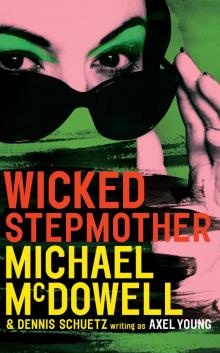 Wicked Stepmother
Wicked Stepmother Blackwater: The Complete Caskey Family Saga
Blackwater: The Complete Caskey Family Saga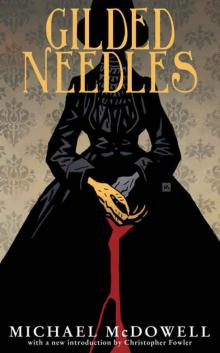 Gilded Needles (Valancourt 20th Century Classics)
Gilded Needles (Valancourt 20th Century Classics)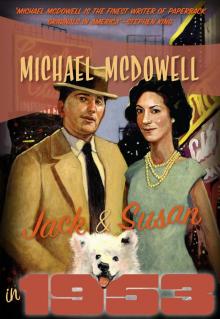 Jack and Susan in 1953
Jack and Susan in 1953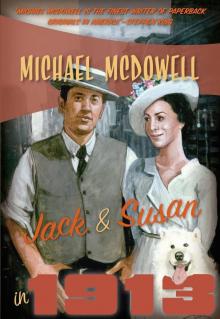 Jack and Susan in 1913
Jack and Susan in 1913 Rain
Rain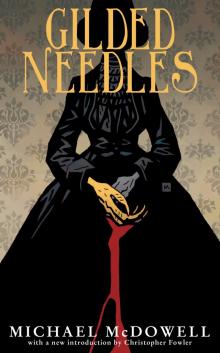 Gilded Needles
Gilded Needles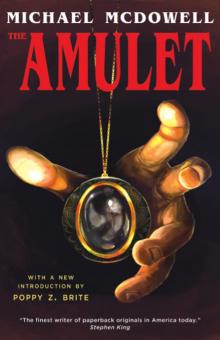 The Amulet
The Amulet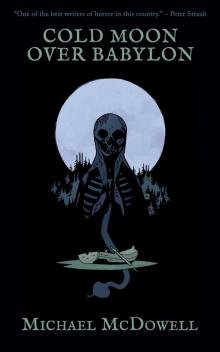 Cold moon over Babylon
Cold moon over Babylon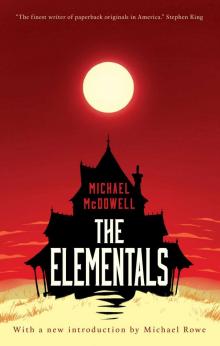 The Elementals
The Elementals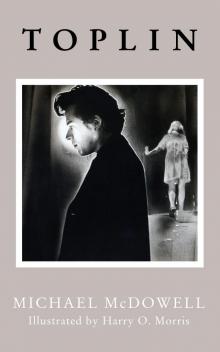 Toplin
Toplin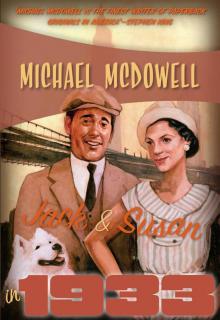 Jack and Susan in 1933
Jack and Susan in 1933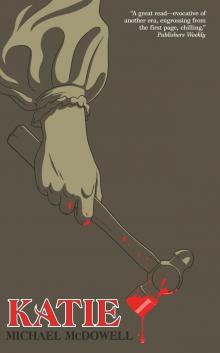 Katie
Katie The Valancourt Book of Horror Stories
The Valancourt Book of Horror Stories